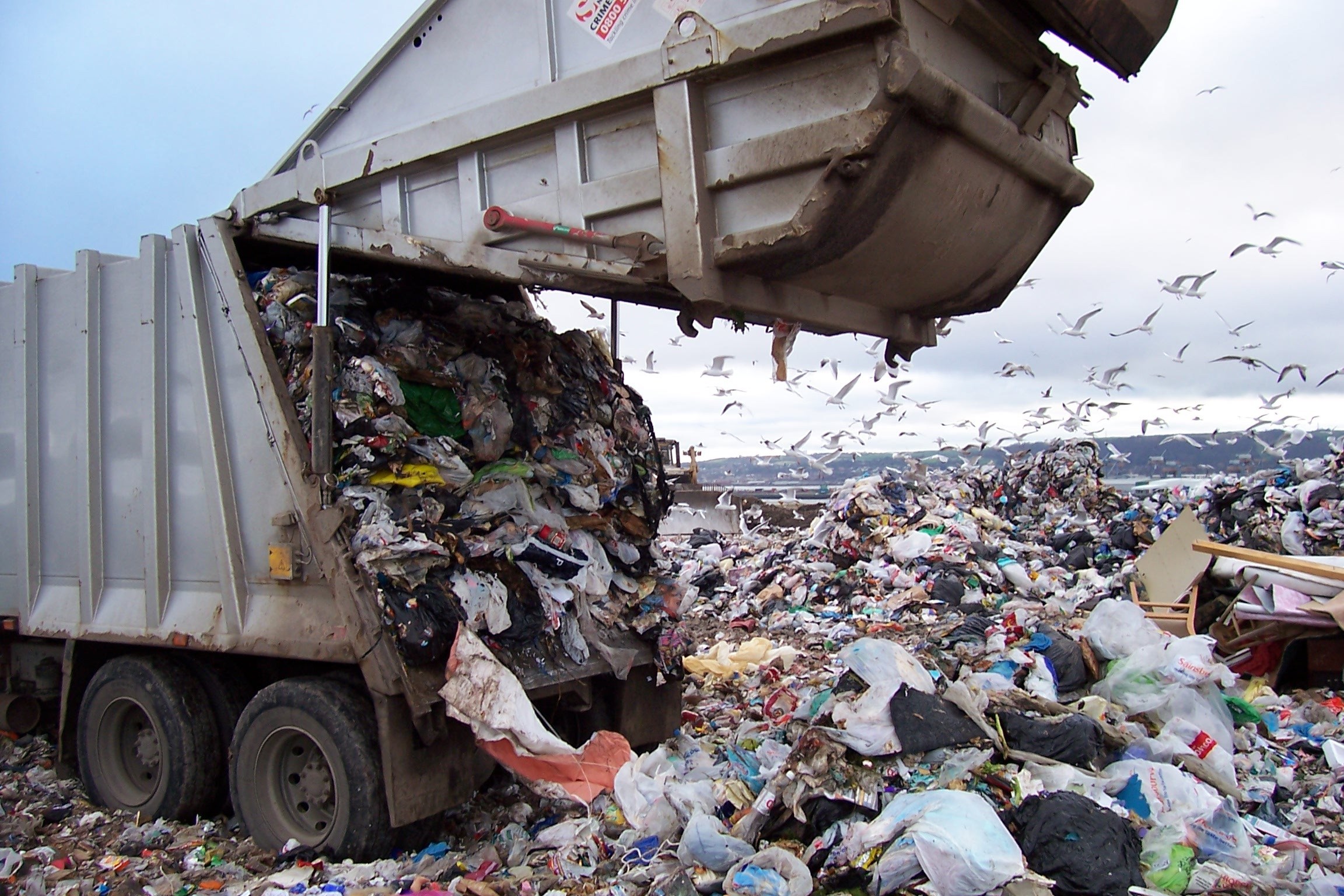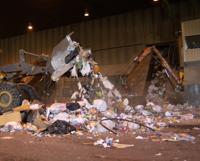by Jim Boyle Editor Jul 7, 2018
The garbage inside trash cans that area residents roll down to the end of their driveways each week might be much more likely to end up in a landfill in the future.
Great River Energy’s Board of Directors will meet this week and again in August in part to consider bringing an end to the Elk River Resource Recovery Project that began in the 1980s and has been under its wing since it took it over in 2009.
The project has diverted 10 million tons of municipal solid waste from landfills and turned it into electricity instead. That has kept landfills from filling up and some from having to be sited. It has also made it possible to recover 742 million pounds of metals and more than 200 million pop cans . All this has been done while operators of the project adhere to stringent environmental standards and reduce carbon intensity (WHAT? Burning creates CO2 emissions) .
“If this project were to close, the next step would be to site the next landfill (no, it is NOT binary — they apparently haven’t heard of zero waste) ,” said Matt Herman, the manager of the Elk River Resource Processing Plant at Great River Energy. “Nobody is going to like it.”
Officials for Great River Energy say changes in the electric power market and the challenges of a private(ANY) operator securing enough waste and revenue in the last decade have reduced the value of the project as a renewable energy provider for the company and its member cooperatives and no longer makes economic success.
Great River Energy, a nonprofit energy cooperative, lost more than $11 million last year from its energy recovery project , which produces 28 megawatts — a small part of its portfolio for its 28 cooperatives (28 MW = 14 new wind turbines, or a handful of large solar projects — if every big box and gov’t building in county had solar on roof, how many MW?). This looks to be another losing proposition for the resource recovery project. They suspect by this time of year in 2019 they will be shutting the operation down, unless they can find a way to keep it going.
“Our attempt to run this as a market-based project is no longer working ,” Herman said. “We are not getting enough garbage with enough tipping fees — the dollars paid for dropping off waste — to make energy we produce reasonable for our members.
“We’re not in this to make truckloads of money. Our goal is to make electricity our members can afford.”
The project started in the mid-1980s through a public and private partnership with Anoka County and United Power Association.
Municipal solid waste from Hennepin, Anoka and Sherburne counties and other nearby communities is delivered to the processing plant in Elk River where it is sorted. The plant captures steel, aluminum and items that can’t be burned and often recycles them (FYI, most things that burn ARE recyclable) . The remaining refuse is used to generate electricity at the Elk River Energy Recovery Station.
For the first 20 years of the project, there was support from county governments, which would reimburse haulers for waste brought to the waste processing plant.
The project not only kept landfills from filling, but it provided 260 jobs in the three surrounding counties and a total of 360 jobs throughout Minnesota, according to a recent study by the Bureau of Business and Economic Research.
The Bureau and the University of Minnesota Duluth’s School of Business and Economics (FYI, Labovitz of UofM Duluth is notoriously not credible) also found the project produces an economic output of more than $50 million annually in three counties, with an added $10 million throughout other areas of the state.
When original contracts (original contracting parties were??) began expiring in 2009, Great River Energy (formerly United Power Association) stepped up to provide a bridge agreement to keep the waste processing facility up and running. Ultimately, it bought the processing plant and the Becker Ash Landfill.
It operated with subsidies from the counties it worked closest with, but those were reduced and phased out over time, Herman said.
“The last few years the processing plant has been run without public subsidy,” he said.
Great River Energy officials have been approaching local counties to see if there’s an interest in public ownership of the Resource Recovery Project, which comprises three facilities:
•The Resource Processing Plant on 165th Avenue in Elk River.
•Elk River Station, which is the steam plant along Highway 10 in Elk River.
•Becker Ash Landfill adjacent to Xcel Energy’s Sherco Plant. (Does Sherco’s ash go here as well? Who owns it? Why is it called “Becker Ash Landfill?)
“Those facilities have processed more than 10 million tons of garbage,” Herman said. “They have eliminated the need for three or four or five landfills from every needing to be created. (They have circumvented enacting a Zero Waste policy).
“Maybe most importantly 4 percent of the waste recovered is recycled metal which amounts to 24 million pounds of steel a year.” (Recovery of metal is recycling, distinct from incineration of garbage.)
Of the nine waste to energy projects in the state, Great River Energy’s is the only one not publicly owned. One of them developed 2.5 years ago when Washington and Ramsey counties came together to take over a facility in Newport. (This is misleading, Xcel Energy owns the garbage burners here in Red Wing, which burns the Washington and Ramsey counties’ garbage, in addition to the Wilmarth garbage burner in Mankato. See “Role of Wilmarth waste burning plant still contentious .
Great River Energy workforce operated it initially and have since been hired on as public employees. (Of what governmental unit?)
“We had a record year for production in 2016, and it looks like we may surpass that this year,” said Zack Hanson, who is with the Ramsey/Washington Recycling and Energy Board. “So far it has been working quite well. We have had good public support and good support from the haulers.”
A view of the Elk River Resource Recovery plant from a distance.
Government has more control over the flow of garbage into a facility and with the use of tipping fees costs can be kept in line. (Misleading — how does collecting a fee influence costs? If fees go up, costs are lower in the ratio?) Those controls were stripped from private operators, Hanson said.
Great River Energy has been met with many potential players, including officials in the counties of Sherburne, Anoka and Hennepin. (Are they letting taxpayers and those paying for garbage collection in these counties about these plans?)
Great River Energy board members will be appraised of what the reaction has been. Officials tell the Star News the reaction has been positive.
Jerry Soma, Anoka County’s administrator, told the Star News he’s not going to say much publicly at this point. He said Anoka County officials need to hear from other players, especially Hennepin County, which is the second biggest player at the table. It provided 37 percent of the waste. Anoka County provided 45 percent. Sherburne County provided 7 percent as did Ramsey County.
One significant challenge, however is in 2016 and 2017, Great River Energy only processed 260,000 tons of municipal solid waste, which is about 60,000 tons below capacity.
By tapping haulers in Wright, Scott and Ramsey, it looks like GRE could top 300,000 tons in 2018 for the first time since 2008, which GRE officials say positions the project to be a valuable asset for public owners.
“The RDF plant can make refuse-derived fuel for a very, very, very long time and that could be a bridge this community and other communities need to get the next generation of fuels,” (28 megawatts isn’t going to do much!) Herman said, noting GRE is already working on those new applications between anaerobic digestion, gasification, organics recycling and making ethanol out of garbage. (Incineration delays movement towards Zero Waste.)
Great River Energy would like to transfer ownership of all three facilities and continue operating the facility under a management, operations and maintenance agreement with the new owner or owners. (Of course, because it’s a money losing proposition.) Officials from Great River Energy say under public ownership, the Resource Recovery Project would be able to operate at capacity with appropriate tipping fees to recover all costs and potentially (What a deal! Why would any local government choose to get into this?)
“For the last several years rural electric cooperative members have been subsidizing metropolitan waste management,” Herman said. “That’s a challenge we have to remedy. We have to find the right people.” (I would hope that looking at having to pay, the counties would double down on reduction of waste, rather than writing a check to make it disappear.)




July 9th, 2018 at 1:08 pm
Burning garbage is a very dirty, carbon intensive, and expensive activity. It yields small amounts of very expensive electricity.
The right move here is to shut this operation down and focus seriously on “Zero Waste.”